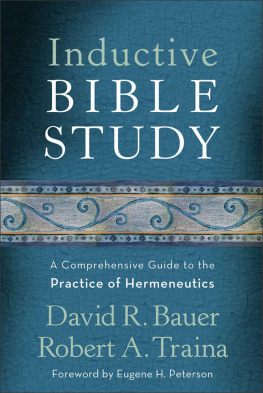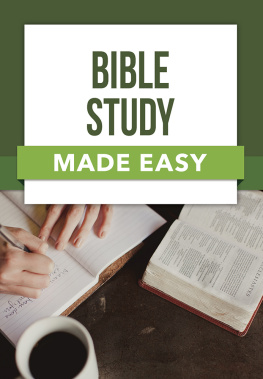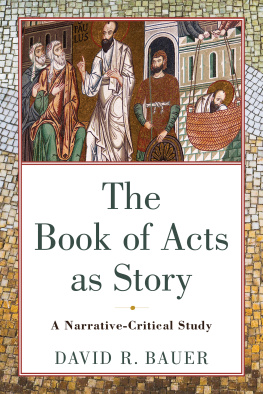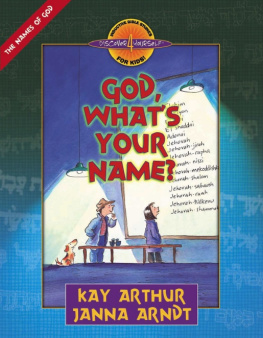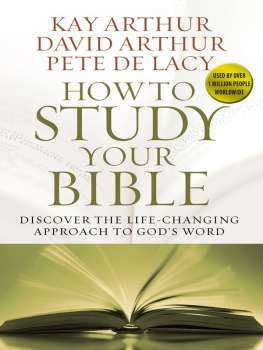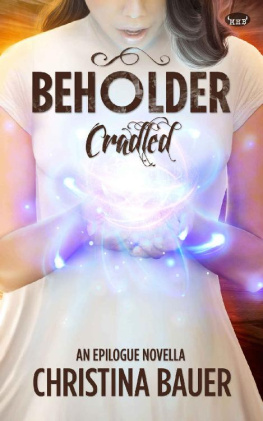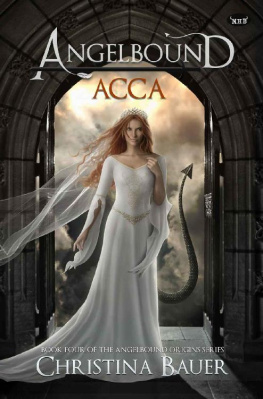Bauer David R. - Inductive Bible Study
Here you can read online Bauer David R. - Inductive Bible Study full text of the book (entire story) in english for free. Download pdf and epub, get meaning, cover and reviews about this ebook. year: 2011, publisher: Baker Publishing Group, genre: Religion. Description of the work, (preface) as well as reviews are available. Best literature library LitArk.com created for fans of good reading and offers a wide selection of genres:
Romance novel
Science fiction
Adventure
Detective
Science
History
Home and family
Prose
Art
Politics
Computer
Non-fiction
Religion
Business
Children
Humor
Choose a favorite category and find really read worthwhile books. Enjoy immersion in the world of imagination, feel the emotions of the characters or learn something new for yourself, make an fascinating discovery.
- Book:Inductive Bible Study
- Author:
- Publisher:Baker Publishing Group
- Genre:
- Year:2011
- Rating:4 / 5
- Favourites:Add to favourites
- Your mark:
- 80
- 1
- 2
- 3
- 4
- 5
Inductive Bible Study: summary, description and annotation
We offer to read an annotation, description, summary or preface (depends on what the author of the book "Inductive Bible Study" wrote himself). If you haven't found the necessary information about the book — write in the comments, we will try to find it.
Inductive Bible Study — read online for free the complete book (whole text) full work
Below is the text of the book, divided by pages. System saving the place of the last page read, allows you to conveniently read the book "Inductive Bible Study" online for free, without having to search again every time where you left off. Put a bookmark, and you can go to the page where you finished reading at any time.
Font size:
Interval:
Bookmark:
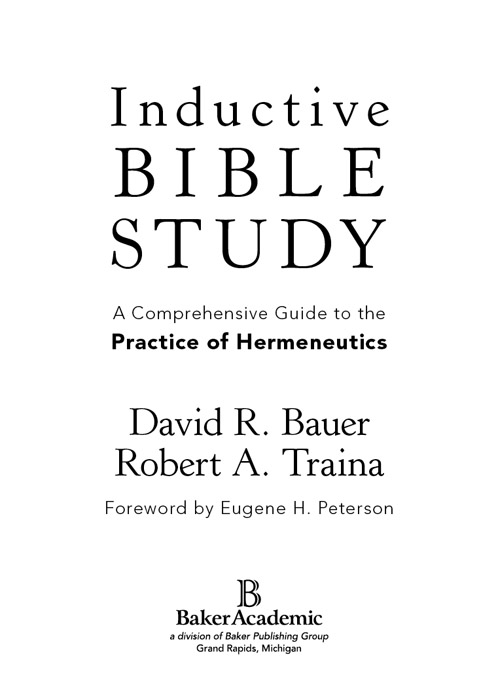
2011 by David R. Bauer and Robert A. Traina
Published by Baker Academic
a division of Baker Publishing Group
P.O. Box 6287, Grand Rapids, MI 49516-6287
www.bakeracademic.com
Ebook edition created 2012
All rights reserved. No part of this publication may be reproduced, stored in a retrieval system, or transmitted in any form or by any meansfor example, electronic, photocopy, recordingwithout the prior written permission of the publisher. The only exception is brief quotations in printed reviews.
ISBN 978-1-4412-1451-5
Library of Congress Cataloging-in-Publication Data is on file at the Library of Congress, Washington, D.C.
Unless otherwise indicated, Scripture quotations are from the New Revised Standard Version of the Bible, copyright 1989, by the Division of Christian Education of the National Council of the Churches of Christ in the United States of America. Used by permission. All rights reserved.
Scripture quotations labeled ASV are from the American Standard Version of the Bible.
Scripture quotations labeled KJV are from the King James Version of the Bible.
Scripture quotations labeled RSV are from the Revised Standard Version of the Bible, copyright 1952 [2nd edition, 1971] by the Division of Christian Education of the National Council of the Churches of Christ in the United States of America. Used by permission. All rights reserved.
This book is dedicated to the memories of
Wilbert Webster White and Howard Tillman Kuist,
pioneers, teachers, interpreters,
men who loved God and Gods Word
Contents
List of Figures
Foreword
Fifty-six years ago I drove into New York City, negotiated my way through the traffic of midtown Manhattan, and enrolled in a seminary on East 49th Street. Later that week I sat in a classroom led by a professor who over the next three years would profoundly change my perception of the Bible, and me with it, in ways that gave shape to everything I have been doing for the rest of my life. This is not an exaggeration.
A couple of years before I entered his classroom, Professor Traina had written the book Methodical Bible Study , which was used throughout the seminary as a text. The book that you hold in your hands, Inductive Bible Study , is an expansion of that early text by Professor Traina and his colleague Professor Bauer. As I read this sequel, memories of my first reading come alive again. I am giving witness to that early but never-diminishing delight.
I grew up in a Christian home and from an early age was familiar with the Bible. I read it daily, memorized it, and on entering into adolescence argued with my friends over it. But quite frankly, I wasnt really fond of it. I knew it was important, knew it was Gods Word. To tell the truth, I was bored with it. More often than not, it was a field of contention, providing material for truths that were contested by warring factions. Or it was reduced to rules and principles that promised to keep me out of moral mud puddles. Orand this was worst of allit was flattened into clichs and slogans and sentimental God-talk, intended to inspire and motivate.
It only took three or four weeks in Professor Trainas classroom for me to become aware of a seismic change beginning to take place within me regarding the Bible. Until now I and all the people with whom I associated had treated the Bible as something to be used used as a textbook with information about God, used as a handbook to lead people to salvation, used as a weapon to defeat the devil and all his angels, used as an antidepressant. Now incrementally, week by week, semester by semester, my reading of the Bible was becoming a conversation. I was no longer reading wordsI was listening to voices; I was observing how these words worked in association with all the other words on the page. And I was learning to listen carefully to these voices, these writers who were, well, writers . Skilled writers, poets, and storytellers who were artists of language. Isaiah and David were poets. Matthew and Luke were masters of the art of narrative. Words were not just words: words were holy.
I employ the term seismic to describe what I was experiencing. Here is another term for what happened: paradigm shift a totally different way to look at and interpret and respond to what I have been looking at all my life. Like the paradigm shift from Ptolemy to Copernicus. The shift from the world of Ptolemy to the world of Copernicus totally changed the way we understand the cosmos. Ptolemy told us that the sun revolved around the earth, and that made perfect sense for a long time. Copernicus told us that the earth revolved around the sun, and suddenly we were seeing things, the same things that we had been seeing all along, but now in a far more accurate and comprehensive way.
When I entered Professor Trainas classroom, I had a Ptolemaic understanding of the Bible: I was the center (my will, my questions, my needs) around which the Bible turned. After three years in that classroom, I was a thoroughgoing Copernican: the Bible was the center (Gods will, Christs questions, the Spirits gifts) around which I turned.
The experience was not merely academic. The passion and patience that permeated that classroom instilled in me an inductive imagination: fiercely attentive to everything that is there and only what is there, alert to relationships both literary and personal, habitually aware of contextthe entire world of creation and salvation that is being revealed in this Bible. And always the insistence that I do this firsthand, not filtered through the hearsay of others or the findings of experts. His faculty colleagues shared the work, but it was Professor Trainas intensity and comprehensiveness that penetrated my mind and spirit in a way that shaped everything I would do and am still doing as a pastor, professor, and writer. And not just my vocational lifealso my personal life, my marriage and family, my friends and community and church. The inductive imagination continued to develop into a biblical imagination.
And not only for me. My sense is that this way of reading the Bibleand living the Biblehas been transformative for thousands; probably by now the number must run into the millions.
Eugene H. Peterson
Pastor Emeritus, Christ Our King Presbyterian Church, Bel Air, Maryland
Professor Emeritus of Spiritual Theology, Regent College, British Columbia
Preface
Our intention is to present rather comprehensively our understanding of the approach to the study of the Bible known as inductive Bible study , and to direct this presentation primarily to seminary students and those engaged in Christian ministry. But we anticipate that this volume will be useful also to scholars who are engaged in advanced study of the Bible and who are conversant with contemporary hermeneutical discussions. Moreover, we hope that it will be serviceable as a textbook for certain college and university courses. Though this book is based on serious hermeneutical reflection and will at points engage current hermeneutical issues, its primary purpose is to provide practical guidance in original, accurate, precise, and penetrating study of the Bible.
This book serves as a sequel to Methodical Bible Study , by Robert A. Traina, which many have used as a reliable introduction to inductive Bible study. We are gratified by the influence and popularity of Methodical Bible Study and are encouraged that it continues to be used as a textbook in numerous seminaries and colleges around the world; yet that book is somewhat dated, for it has not been revised since its appearance in 1952. Moreover, whereas Methodical Bible Study was intended to be a general description of inductive Bible study, arranged topically in terms of major components, this book offers a specific, orderly process that readers can apply directly as they work with particular biblical texts. In addition, it reflects significant developments in the presentation of method that have come about as the result of years of classroom instruction, further reflection, and new insights into hermeneutics that have emerged since 1952. Together we have a combined sixty years of seminary teaching of inductive Bible study since Methodical Bible Study first appeared.
Next pageFont size:
Interval:
Bookmark:
Similar books «Inductive Bible Study»
Look at similar books to Inductive Bible Study. We have selected literature similar in name and meaning in the hope of providing readers with more options to find new, interesting, not yet read works.
Discussion, reviews of the book Inductive Bible Study and just readers' own opinions. Leave your comments, write what you think about the work, its meaning or the main characters. Specify what exactly you liked and what you didn't like, and why you think so.

